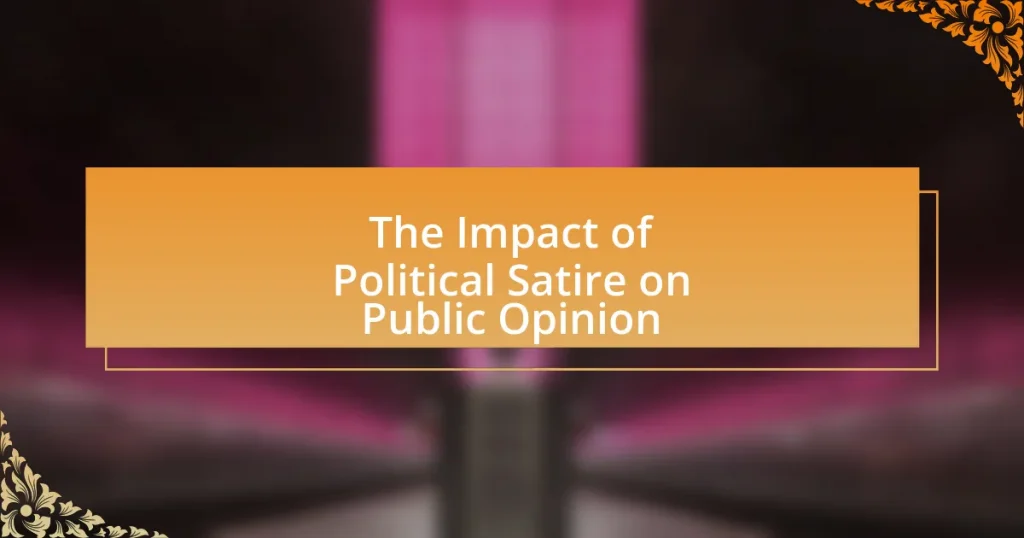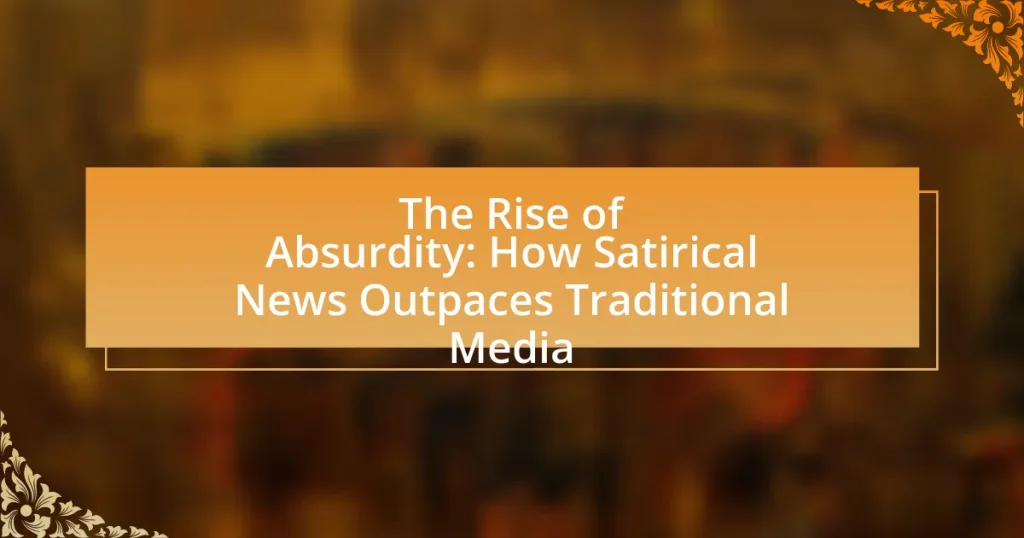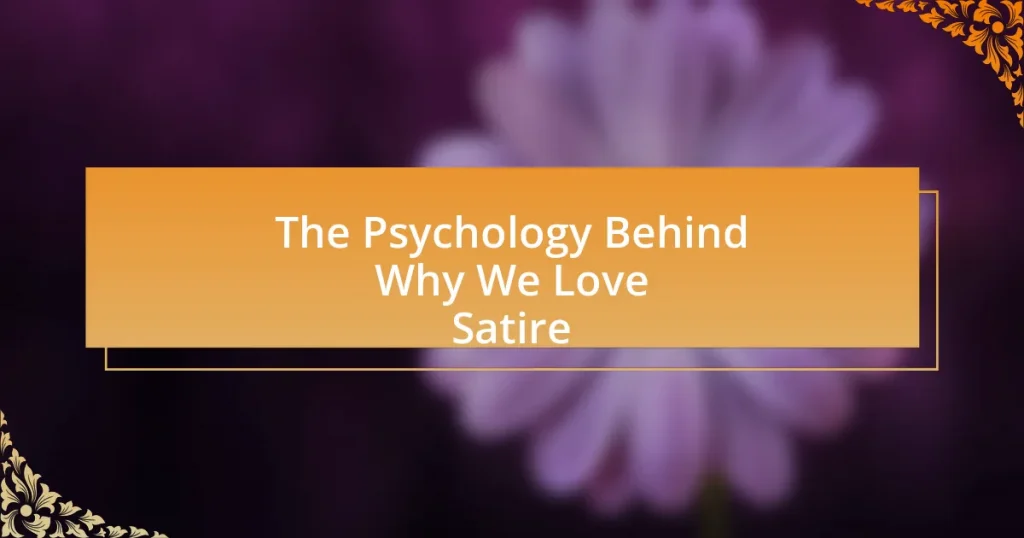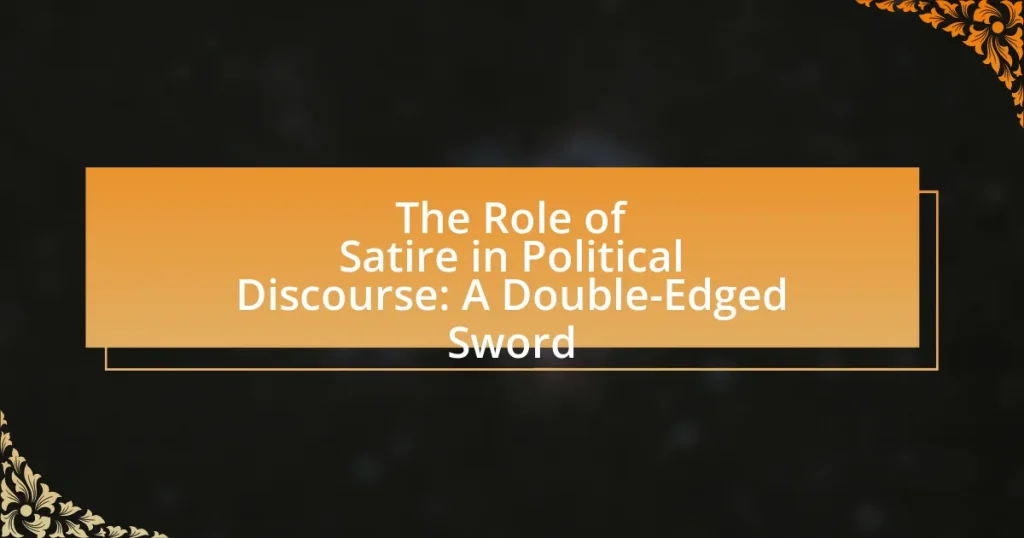Political satire plays a significant role in shaping public opinion by influencing perceptions of political figures and issues. Research indicates that exposure to satirical content enhances political knowledge and engagement, particularly among younger audiences, by simplifying complex topics and encouraging critical thinking. The article explores the mechanisms through which political satire affects public discourse, the impact of tone on audience reception, and the differences between satire and traditional news reporting. Additionally, it examines the cultural implications of satire, its potential to mobilize or demobilize voters, and the challenges faced by creators in navigating legal and ethical considerations. Overall, political satire serves as a powerful tool for critiquing political systems and fostering civic engagement.
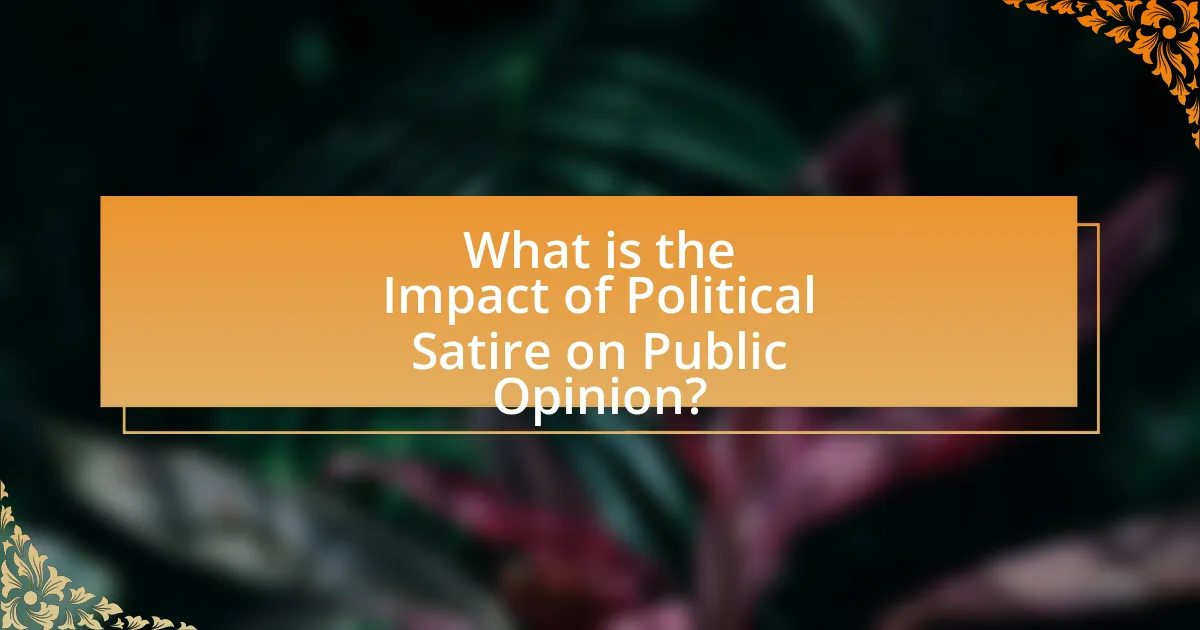
What is the Impact of Political Satire on Public Opinion?
Political satire significantly influences public opinion by shaping perceptions of political figures and issues. Research indicates that exposure to political satire can enhance political knowledge and engagement, particularly among younger audiences. For instance, a study published in the journal “Political Communication” by researchers at the University of Pennsylvania found that viewers of satirical programs like “The Daily Show” were more informed about political events compared to non-viewers. Additionally, political satire often frames issues in a way that highlights absurdities and contradictions in political discourse, prompting audiences to critically evaluate their beliefs and the actions of their leaders. This effect can lead to increased skepticism towards traditional news sources and political institutions, ultimately altering the landscape of public opinion.
How does political satire influence the perceptions of political events?
Political satire significantly influences perceptions of political events by shaping public discourse and framing issues in a way that highlights absurdities and contradictions in political behavior. This form of satire often simplifies complex political situations, making them more accessible and engaging for the audience, which can lead to increased awareness and critical thinking about political matters. Research indicates that exposure to political satire can enhance political knowledge and encourage civic engagement, as seen in studies like “The Effects of Political Satire on Political Knowledge and Engagement” by Jeffrey M. Berry and Sarah Sobieraj, published in the journal “Political Communication.” This study found that viewers of satirical content were more likely to discuss political issues and participate in political activities, demonstrating that satire not only entertains but also informs and mobilizes the public.
What are the mechanisms through which political satire shapes public opinion?
Political satire shapes public opinion through mechanisms such as humor, simplification of complex issues, and the promotion of critical thinking. Humor engages audiences, making political content more accessible and memorable, which can lead to increased awareness and discussion of political issues. Simplification distills complex political topics into relatable narratives, allowing individuals to grasp essential points quickly, as evidenced by studies showing that satirical content can enhance understanding of political events. Additionally, political satire encourages critical thinking by challenging prevailing narratives and prompting audiences to question authority, as demonstrated by research indicating that exposure to satire can lead to greater skepticism towards political figures and institutions.
How does the tone of political satire affect audience reception?
The tone of political satire significantly influences audience reception by shaping how individuals interpret and engage with political messages. A satirical tone that is humorous and light-hearted tends to make the content more accessible, encouraging audiences to reflect on political issues without feeling defensive. Conversely, a harsh or aggressive tone can alienate viewers, leading to resistance against the underlying message. Research indicates that audiences are more likely to accept and share satirical content that resonates emotionally, as seen in studies where humorous satire increased political engagement among younger demographics. This demonstrates that the tone not only affects immediate reactions but also long-term attitudes toward political discourse.
Why is political satire significant in contemporary media?
Political satire is significant in contemporary media because it serves as a powerful tool for critiquing political figures and policies, thereby shaping public opinion. By using humor and irony, political satire engages audiences, making complex political issues more accessible and stimulating critical thinking. Research indicates that programs like “The Daily Show” and “Saturday Night Live” have influenced viewers’ perceptions of political events and candidates, often increasing political awareness and participation among younger demographics. For instance, a study by the Pew Research Center found that satirical news can lead to higher levels of political engagement, as viewers are more likely to discuss political issues after consuming satirical content. This demonstrates that political satire not only entertains but also plays a crucial role in informing and mobilizing the public.
What role does political satire play in the political discourse?
Political satire plays a significant role in shaping political discourse by providing a critical lens through which audiences can engage with political issues. It serves to highlight absurdities, expose corruption, and challenge the status quo, often making complex political topics more accessible and relatable to the public. Research indicates that political satire can influence public opinion by increasing political awareness and encouraging civic engagement, as seen in studies showing that viewers of satirical programs are more likely to discuss political issues and participate in elections. For instance, a study published in the journal “Political Communication” found that exposure to satirical content correlates with higher levels of political knowledge among young adults. Thus, political satire not only entertains but also fosters informed public discourse and active participation in the democratic process.
How does political satire differ from traditional news reporting?
Political satire differs from traditional news reporting primarily in its intent and presentation. While traditional news reporting aims to inform the public with factual, unbiased information, political satire uses humor, exaggeration, and irony to critique political figures and policies. This distinction is evident in the format; traditional news adheres to journalistic standards of objectivity and accuracy, whereas political satire often employs comedic elements to engage audiences and provoke thought. For instance, shows like “Saturday Night Live” and “The Daily Show” blend entertainment with commentary, influencing public perception and discourse by highlighting absurdities in politics, which traditional news may present more straightforwardly.
What are the potential consequences of political satire on public engagement?
Political satire can significantly enhance public engagement by making complex political issues more accessible and relatable. This form of satire often encourages critical thinking and discussion among audiences, as it presents political content in a humorous and engaging manner. Research indicates that exposure to political satire can increase political knowledge and motivate individuals to participate in political processes, such as voting or activism. For instance, a study published in the journal “Political Communication” found that viewers of satirical programs like “The Daily Show” were more likely to discuss political issues and engage in civic activities compared to those who consumed traditional news. Thus, the consequences of political satire on public engagement include heightened awareness, increased discourse, and greater participation in democratic processes.
How can political satire mobilize or demobilize voters?
Political satire can mobilize voters by engaging them through humor and critical commentary, which can increase political awareness and participation. For instance, studies have shown that exposure to satirical content, such as programs like “The Daily Show,” correlates with higher levels of political engagement among younger audiences, as they are more likely to discuss political issues and participate in elections. Conversely, political satire can demobilize voters by fostering cynicism and apathy, as constant negative portrayals of politicians and the political system may lead individuals to feel disillusioned and less likely to vote. Research indicates that when satire emphasizes the ineffectiveness of political processes, it can discourage voter turnout, as seen in surveys where individuals express feelings of futility regarding their vote’s impact.
What impact does political satire have on political polarization?
Political satire significantly contributes to political polarization by reinforcing existing biases and deepening divisions among partisan groups. Research indicates that individuals who consume political satire often align more closely with their political in-group, leading to increased animosity toward opposing views. For instance, a study published in the journal “Political Communication” by researchers from the University of Pennsylvania found that exposure to partisan satire heightened negative perceptions of the opposing party, thereby exacerbating polarization. This effect is particularly pronounced among younger audiences who are more likely to engage with satirical content, further entrenching their political identities.
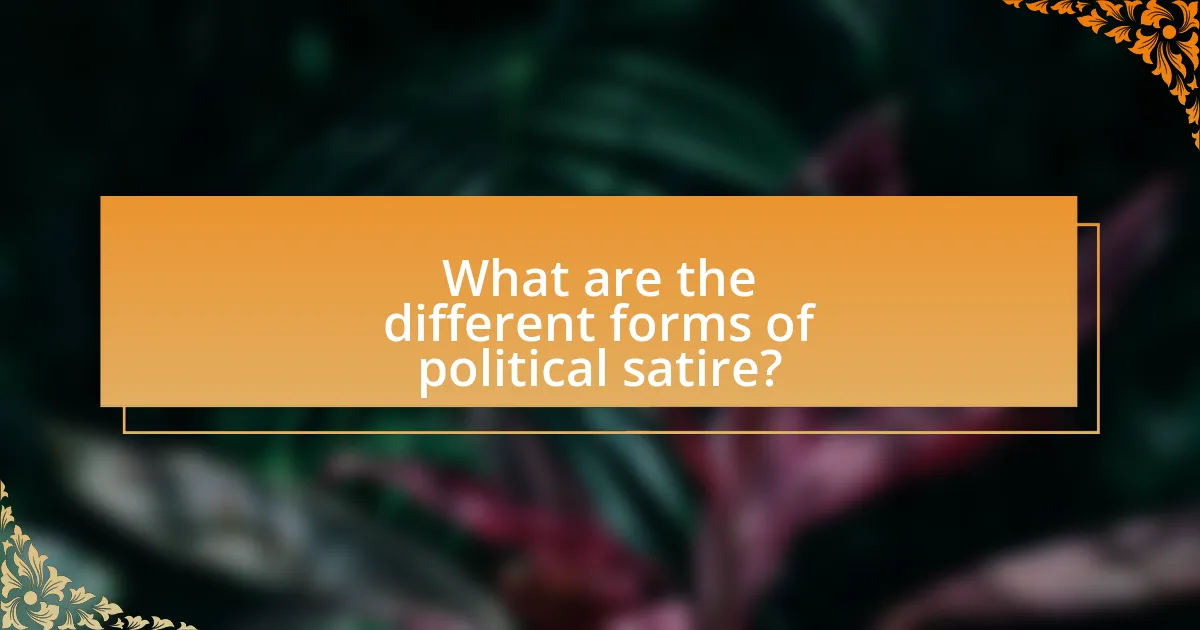
What are the different forms of political satire?
Political satire manifests in various forms, including television shows, cartoons, literature, and social media. Television shows like “Saturday Night Live” and “The Daily Show” use humor and parody to critique political figures and events, influencing public perception. Political cartoons, often published in newspapers, visually depict political issues and figures, providing commentary that can shape opinions. Satirical literature, such as George Orwell’s “Animal Farm,” employs allegory to critique political systems, while social media platforms allow for rapid dissemination of satirical content, engaging younger audiences and fostering discussions. Each form serves to highlight societal issues and provoke thought, thereby impacting public opinion on political matters.
How do various media formats contribute to political satire?
Various media formats, including television, social media, and print, significantly contribute to political satire by providing diverse platforms for humor and critique of political events. Television shows like “Saturday Night Live” and “The Daily Show” use visual storytelling and comedic timing to engage audiences, making complex political issues more accessible and entertaining. Social media platforms, such as Twitter and TikTok, allow for rapid dissemination of satirical content, enabling users to share and react to political commentary instantly, which amplifies its reach and impact. Print media, including cartoons and satirical articles, offers a traditional yet effective means of commentary that can provoke thought and discussion among readers. Research indicates that exposure to political satire can enhance public engagement and awareness, as evidenced by studies showing that viewers of satirical programs are more likely to discuss political issues and participate in civic activities.
What are the characteristics of television-based political satire?
Television-based political satire is characterized by humor, exaggeration, and critique of political figures and events. This genre often employs comedic formats, such as sketches, parodies, and monologues, to engage audiences while delivering political commentary. Notable examples include programs like “Saturday Night Live” and “The Daily Show,” which blend entertainment with analysis, making complex political issues more accessible. Research indicates that such satire can influence public opinion by shaping perceptions of political credibility and increasing political engagement among viewers, as evidenced by studies showing that audiences of satirical content are more likely to discuss political issues and participate in civic activities.
How does online political satire differ from traditional formats?
Online political satire differs from traditional formats primarily in its accessibility and immediacy. Traditional political satire, often found in print media or television, typically has a delayed production cycle and limited audience reach, whereas online political satire can be created and disseminated rapidly across various platforms, reaching a global audience instantly. For example, social media allows for real-time engagement and sharing, enabling satirical content to go viral quickly, which amplifies its impact on public opinion. This immediacy and broad accessibility enhance the ability of online satire to influence political discourse and shape perceptions in ways that traditional formats may struggle to achieve.
What are the cultural implications of political satire?
Political satire significantly influences cultural perceptions and societal norms by shaping public discourse and challenging authority. It serves as a tool for social critique, allowing individuals to question political decisions and societal issues through humor and irony. For instance, studies have shown that political satire can increase political engagement among audiences, as seen in the rise of programs like “The Daily Show,” which has been credited with motivating younger viewers to participate in elections. Furthermore, political satire can foster a sense of community among those who share similar views, reinforcing group identity and cultural values. This impact is evident in various cultures where satire has historically played a role in social movements, such as the use of caricatures in France during the Enlightenment to critique the monarchy. Thus, political satire not only entertains but also serves as a catalyst for cultural reflection and change.
How does political satire reflect societal values and norms?
Political satire reflects societal values and norms by critiquing and exaggerating political behaviors, thereby revealing public sentiments and cultural attitudes. This form of expression often highlights issues such as corruption, inequality, and social justice, mirroring the collective consciousness of society. For instance, shows like “Saturday Night Live” and “The Daily Show” have historically addressed significant political events and societal concerns, influencing public discourse and shaping perceptions. Research indicates that audiences often use political satire to gauge the credibility of political figures and institutions, demonstrating its role as a barometer for societal values.
What role does humor play in the effectiveness of political satire?
Humor plays a crucial role in the effectiveness of political satire by making complex political issues more accessible and engaging to the audience. This accessibility allows individuals to critically reflect on political events and figures in a less confrontational manner, fostering a deeper understanding of the subject matter. Research indicates that humor can enhance retention of information; for instance, a study published in the journal “Political Psychology” found that humorous content significantly increases audience engagement and recall of political messages. By using humor, political satire can effectively challenge prevailing narratives and encourage viewers to question authority, ultimately influencing public opinion.
What challenges do creators of political satire face?
Creators of political satire face significant challenges, including censorship, backlash from political figures, and the risk of misinterpretation by audiences. Censorship can arise from government regulations or social media platforms that restrict content deemed inappropriate, limiting the creators’ ability to express their viewpoints. Backlash from political figures can lead to threats or legal action, as seen in cases where satirists have faced lawsuits for their work. Additionally, audiences may misinterpret satire, leading to confusion about the intended message, which can dilute the impact of the satire on public opinion. These challenges highlight the precarious balance satirists must maintain between humor and the potential consequences of their work.
How do legal and ethical considerations impact political satire?
Legal and ethical considerations significantly impact political satire by shaping the boundaries within which satirists operate. Legal frameworks, such as defamation laws, restrict the ability to make false statements about individuals, which can lead to lawsuits if satire crosses into harmful territory. For instance, the landmark case of Hustler Magazine v. Falwell established that public figures must prove actual malice to win a defamation case, thereby providing some protection for satirical expression. Ethically, satirists face the challenge of balancing humor with respect for individuals and groups, as offensive content can perpetuate stereotypes or incite violence. This ethical responsibility influences the content and tone of political satire, as creators navigate the potential repercussions of their work on public perception and societal norms.
What are the risks of misinterpretation in political satire?
Misinterpretation in political satire poses significant risks, including the potential for misinformation and polarization among audiences. When satire is misunderstood, individuals may take exaggerated or humorous portrayals literally, leading to distorted perceptions of political figures or issues. For instance, a study by the Pew Research Center found that 62% of Americans reported that they often or sometimes misunderstand satire, which can contribute to the spread of false narratives. Additionally, misinterpretation can deepen political divides, as individuals may reinforce their biases by interpreting satire in a way that aligns with their pre-existing beliefs, further entrenching partisan viewpoints.
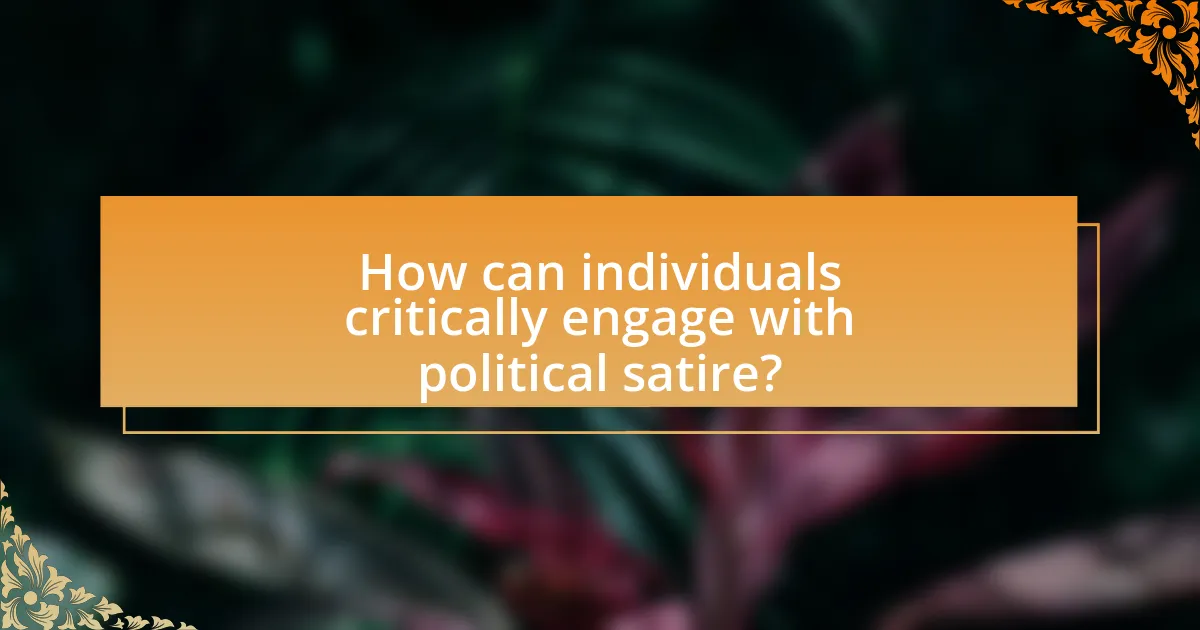
How can individuals critically engage with political satire?
Individuals can critically engage with political satire by analyzing the underlying messages and techniques used in the satire. This involves examining the context, identifying the target of the satire, and evaluating the effectiveness of the humor in conveying political commentary. Research indicates that political satire can influence public opinion by shaping perceptions of political figures and issues, as seen in studies like “The Effects of Political Satire on Public Opinion” by Hollander and Karpowitz, which found that exposure to satirical content can alter viewers’ attitudes towards political events. By actively questioning the intent and implications of the satire, individuals can develop a more nuanced understanding of the political landscape.
What strategies can help audiences discern the effectiveness of political satire?
Audiences can discern the effectiveness of political satire by analyzing its context, intent, and reception. Understanding the context involves recognizing the political climate and the specific issues being satirized, which helps audiences gauge the relevance and accuracy of the satire. Evaluating the intent requires audiences to consider whether the satire aims to provoke thought, entertain, or mislead, as this influences its effectiveness in conveying a message. Lastly, examining audience reception through discussions, social media reactions, and critical reviews provides insight into how well the satire resonates and influences public opinion. Research indicates that effective political satire often leads to increased political engagement and awareness, as seen in studies like “The Effects of Political Satire on Public Opinion” by researchers at the University of Pennsylvania, which found that audiences who engage with satire are more likely to discuss political issues and participate in civic activities.
How can viewers identify bias in political satire?
Viewers can identify bias in political satire by analyzing the language, tone, and subject matter presented. Political satire often employs exaggeration, selective storytelling, and humor to convey a particular viewpoint, which can reveal underlying biases. For instance, if a satirical piece consistently portrays one political party in a negative light while favoring another, it indicates a bias. Research shows that audiences are more likely to recognize bias when they are familiar with the political context and the satirist’s previous work, as familiarity helps them discern patterns in the portrayal of political figures and events.
What questions should audiences ask to evaluate the credibility of political satire?
Audiences should ask whether the political satire is based on factual information and reliable sources. Evaluating the credibility of political satire involves questioning the accuracy of the claims made, the reputation of the creators, and the context in which the satire is presented. For instance, audiences can investigate if the satire references verifiable events or statements, as well as whether it employs exaggeration or misrepresentation for comedic effect. Additionally, audiences should consider the intent behind the satire—whether it aims to inform, entertain, or manipulate public opinion. Understanding these aspects helps audiences discern the potential impact of the satire on their perceptions and beliefs.
What are the best practices for consuming political satire responsibly?
To consume political satire responsibly, individuals should critically evaluate the content, recognizing its comedic nature while distinguishing it from factual reporting. Engaging with multiple sources of information, including traditional news outlets, helps to contextualize the satire and avoid misinformation. Additionally, understanding the intent behind the satire—often to provoke thought or highlight absurdities—can enhance comprehension and prevent misinterpretation. Research indicates that audiences who actively engage with satire, rather than passively consuming it, are better equipped to discern its implications and maintain an informed perspective on political issues.
How can individuals balance entertainment and information in political satire?
Individuals can balance entertainment and information in political satire by critically evaluating the content they consume and seeking diverse perspectives. Engaging with satire that incorporates factual information alongside humor allows individuals to appreciate the entertainment value while remaining informed about political issues. Research indicates that political satire can enhance understanding of complex topics; for instance, a study published in the journal “Political Communication” found that viewers of satirical news shows demonstrated greater political knowledge compared to those who consumed traditional news. By actively discerning the underlying messages and verifying claims presented in satirical formats, individuals can effectively navigate the intersection of entertainment and information in political discourse.
What role does critical thinking play in understanding political satire?
Critical thinking is essential for understanding political satire as it enables individuals to analyze, interpret, and evaluate the underlying messages and intentions of satirical content. By employing critical thinking skills, individuals can discern the difference between humor and serious commentary, allowing them to grasp the complexities of political issues being addressed. Research indicates that audiences who engage in critical thinking are more likely to recognize the satirical elements and the social or political critiques embedded within the humor, leading to a more informed public discourse. For instance, a study published in the Journal of Communication found that individuals with higher critical thinking skills were better at identifying the satirical intent in media, which in turn influenced their perceptions of political figures and policies.
How can political satire be used as a tool for civic engagement?
Political satire can be used as a tool for civic engagement by simplifying complex political issues and encouraging public discourse. By employing humor and irony, political satire makes political content more accessible, allowing individuals to grasp important topics that may otherwise seem daunting. Research indicates that exposure to political satire can increase political knowledge and motivate viewers to participate in civic activities, such as voting or activism. For instance, a study published in the journal “Political Communication” found that individuals who consume political satire are more likely to discuss political issues and engage in civic behaviors compared to those who do not. This demonstrates that political satire not only entertains but also serves as a catalyst for informed civic participation.
What are effective ways to discuss political satire in community settings?
Effective ways to discuss political satire in community settings include organizing discussion groups, utilizing social media platforms, and hosting community events focused on satire. Discussion groups allow participants to share their interpretations and reactions to specific satirical content, fostering a deeper understanding of the underlying political messages. Social media platforms can facilitate broader engagement, enabling individuals to share satirical pieces and encourage dialogue among diverse audiences. Community events, such as workshops or panels featuring local comedians or satirists, can provide a space for live discussions and enhance the communal experience of satire. Research indicates that engaging with political satire can enhance critical thinking and promote political awareness, making these methods particularly effective in shaping public opinion.
How can political satire inspire action among citizens?
Political satire can inspire action among citizens by highlighting societal issues and encouraging critical thinking about political systems. Through humor and exaggeration, satire makes complex political topics more accessible, prompting audiences to engage with and question the status quo. For example, shows like “The Daily Show” and “Saturday Night Live” have historically mobilized viewers to participate in political processes, such as voting or activism, by exposing corruption and injustice in a relatable manner. Research indicates that exposure to political satire can increase political knowledge and efficacy, leading to higher rates of civic engagement, as evidenced by a study published in the journal “Political Communication,” which found that satirical content significantly influenced viewers’ likelihood to discuss political issues and participate in elections.
